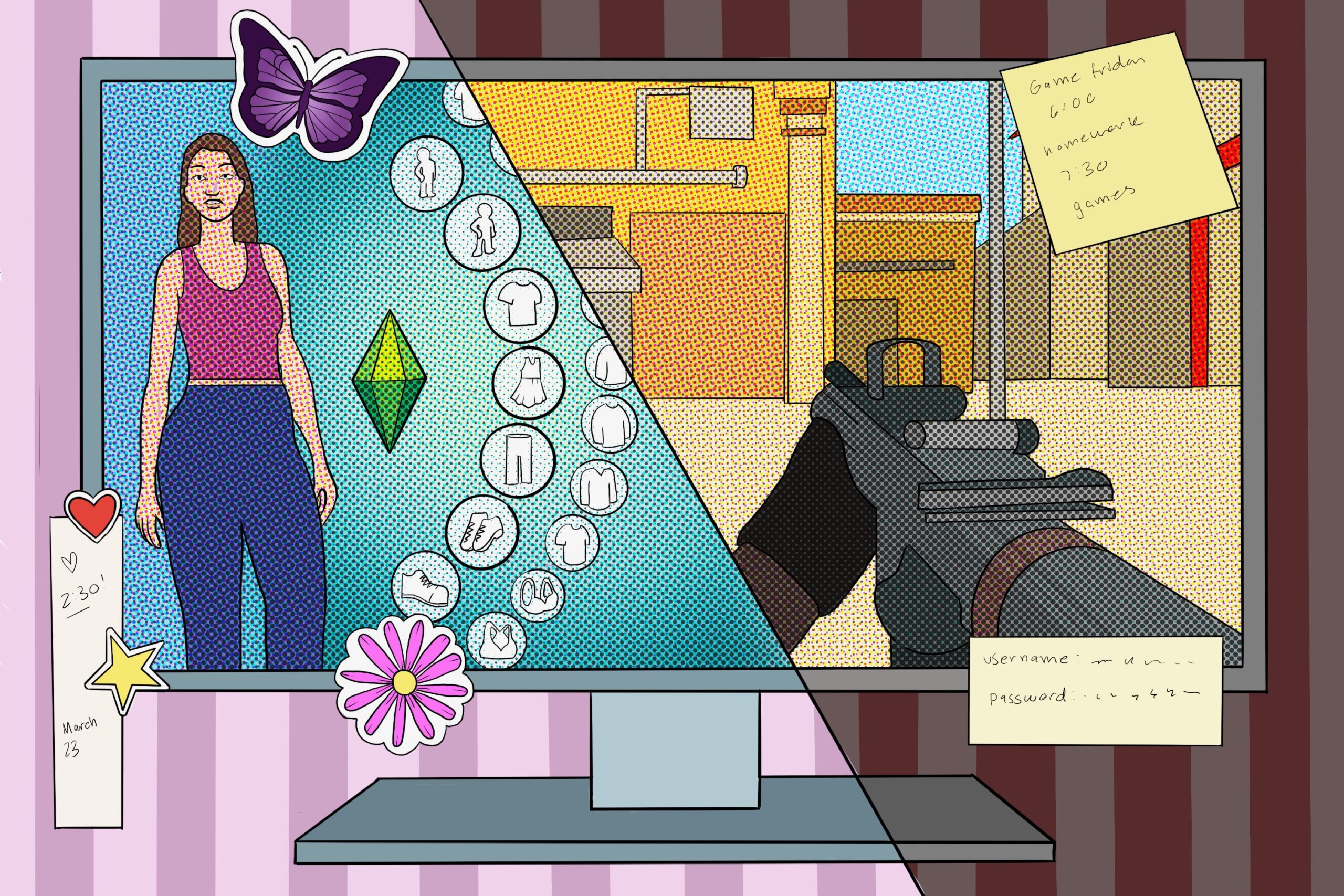How do the gender norms projected in toys and video games create a large female audience in The Sims franchise?
The Sims game series has been relevant since its creation in 2002. The Sims franchise has become one of the best-selling PC games of all time, selling 100 million units worldwide by 2008. The Sims franchise is well known for its popularity among women becoming an inside joke in the gaming community. But what makes this franchise have such a large female audience?
From a very young age, children are bombarded with messages at a young age about what is appropriate for their assigned gender. Boys are pressed into engaging with toys and activities that highlight force, competitiveness, and dominance with action. These same themes are featured in many action-oriented video games.
Girls, by contrast, are directed toward toys that emphasize nurturing, creativity, cooking and interpersonal skills that are reflected in games such as The Sims. As a result of these formative influences, boys and girls grow into having distinctly different gaming preferences based on the types of gender-based toys and activities they were raised on.
The Sims is an open-world game that consists of customizing your own avatar called a Sim with qualities of your choosing such as personality, diet, and physical features such as skin color, hair, body shape etc. After choosing these qualities, you are then able to customize their clothing and create outfits for different occasions such as formal events, or active wear to exercise in. After this process, you are then guided to choose a town for your Sim to live in and create their own house. From this point on, you can choose the hobbies and careers your Sim can participate in.
The careers range from a wide variety that includes standard jobs such as Writer, Chef, and Detective as well as nontraditional roles such as Criminal, Social Media Influencer, and Astronaut. While The Sims games have been adding more details for each release, the foolproof formula for the games has remained the same.
The Sims base games are sold separately from many expansion packs offered such as Seasons, Cats & Dogs, and Island Living, so in the Sims gaming community, many players have created and shared mods which are fan base alterations to games. This has created more options from the limited scope of the base game. These mods can include aesthetic additions to the itself such as clothing, hair, eye, and makeup options as well as options for furniture, roofs, and backdrops.
The action of creating a Sim and their house from scratch has many qualities reminiscent of customizing your own virtual doll and dollhouse. The Sims franchise has even elevated these qualities and made them more realistic with the addition of a career, a love life, and the unpredictability that comes with leaving your Sim unattended for a long period. The chance of your Sim dying as well as possible in the game affects how players treat their Sim.
While gaming offers a realm of escapism, it often mirrors the realities of the world outside the screen. Traditional gender roles and stereotypes permeate gaming narratives, reinforcing existing societal norms. In many games, male protagonists dominate the action genre and embody strength, courage and heroism, while female characters are often relegated to secondary roles or hypersexualized personas such as Mileena from Mortal Kombat. Such portrayals not only limit the diversity of gaming experiences but also perpetuate harmful stereotypes, alienating potential players and reinforcing gender biases.
The Sims franchise combats these issues by equally offering equal customization options to male and female Sims. The same personality traits, and careers, and giving male and female sims access to the same clothing whether it is seen as nontraditionally male or female. Furthermore, The Sims franchise also addresses racial and cultural diversity by providing a wide range of skin tones, hairstyles, and cultural accessories for players to choose from. By prioritizing representation and inclusivity, the franchise fosters a more inclusive gaming environment where players can express themselves freely and feel represented in the virtual world.
The popularity of The Sims franchise can be attributed not only to its innovative gameplay mechanics and customizable features but also to its commitment to inclusivity and representation. By offering players the freedom to create characters that reflect their own identities and providing a diverse range of options for customization, The Sims transcends traditional gender norms and stereotypes prevalent in many other gaming experiences. Through its inclusive approach, the franchise has created a female audience where they can have autonomy over their gameplay and characters without being objectified.
As the gaming landscape continues to evolve, The Sims sets a standard, that when women feel included and seen as human when gaming, they will become active participants in the gaming community.

















